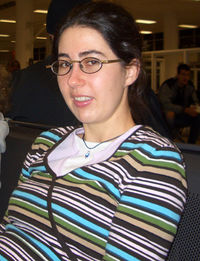Julia Wahl: Difference between revisions
No edit summary |
No edit summary |
||
| (3 intermediate revisions by the same user not shown) | |||
| Line 3: | Line 3: | ||
|image=JuliaWahlPortrait.jpg <!-- You can replace all the template's variables with the appropriate content--> | |image=JuliaWahlPortrait.jpg <!-- You can replace all the template's variables with the appropriate content--> | ||
|period= 1/9/2006 - 30/11/2006 | |period= 1/9/2006 - 30/11/2006 | ||
|title= [[Visiting | |title= [[Visiting Research Associate]] | ||
|projects= | |projects= | ||
|interests= | |interests= | ||
| Line 13: | Line 13: | ||
}} | }} | ||
Ms. '''Julia Anne Wahl''' is a psychologist who has spent a semester at the [[New Media Lab]] as an exchange student in a collaboration with Prof. [[Peter Gerjets]] from the [[Knowledge Media Research Center]]. | Ms. '''Julia Anne Wahl''' is a clinical psychologist and researcher who has spent a semester at the [[New Media Lab]] as an exchange student in a collaboration with Prof. [[Peter Gerjets]] from the [[Knowledge Media Research Center]]. Julia worked on research related to the [[Mental Attributes Profiling System]] as well as for the collaborative [[Dynamic Visualizations in Instruction]] project. | ||
==Short bio== | ==Short bio== | ||
Ms. Julia Anne Wahl has a degree in Psychology. She was a research assistant at the [[Knowledge Media Research Center]] (KMRC) in Tuebingen, Germany. She was with CNTI between September 1st and November 30th,2006. Her activities included working in a project, which runs under the title “multimedia-based learning programs for children with dyslexia”. It consists of a series of studies using a specially designed multimedia-learning environment. With respect to theoretical approaches and empirical findings in the field of multimedia learning and dyslexia its main goal is to develop educational software adequate for dyslexic children that will enhance their learning outcome. | Ms. Julia Anne Wahl has a degree in Psychology. She was a research assistant at the [[Knowledge Media Research Center]] (KMRC) in Tuebingen, Germany. She was with CNTI between September 1st and November 30th,2006. Her activities included working in a project, which runs under the title “multimedia-based learning programs for children with dyslexia”. It consists of a series of studies using a specially designed multimedia-learning environment. With respect to theoretical approaches and empirical findings in the field of multimedia learning and dyslexia its main goal is to develop educational software adequate for dyslexic children that will enhance their learning outcome. | ||
==Joint Publications== | |||
Taraszow, T., Laouris,Y., Wahl, J., Scheiter, K., & Gerjets, P. (2008, November). A Matter of Modality: Do Multimedia Learning Environments really Support Students with Reading Difficulties? Paper presented at the 7th European Conference on e-Learning (ECEL), Ayia Napa, Cyprus. | |||
Taraszow, T., Wahl, J., Laouris, Y., Scheiter, K., & Gerjets, P. (2007, November). Using Dynamic Visualization with written explanation to by-pass information processing deficits of children with reading difficulties. In EARLI Conference, Budapest. | |||
[[Category:Visiting Scientists]] | [[Category:Visiting Scientists]] | ||
Latest revision as of 11:28, 25 October 2014
|
Ms. Julia Anne Wahl is a clinical psychologist and researcher who has spent a semester at the New Media Lab as an exchange student in a collaboration with Prof. Peter Gerjets from the Knowledge Media Research Center. Julia worked on research related to the Mental Attributes Profiling System as well as for the collaborative Dynamic Visualizations in Instruction project.
Short bio
Ms. Julia Anne Wahl has a degree in Psychology. She was a research assistant at the Knowledge Media Research Center (KMRC) in Tuebingen, Germany. She was with CNTI between September 1st and November 30th,2006. Her activities included working in a project, which runs under the title “multimedia-based learning programs for children with dyslexia”. It consists of a series of studies using a specially designed multimedia-learning environment. With respect to theoretical approaches and empirical findings in the field of multimedia learning and dyslexia its main goal is to develop educational software adequate for dyslexic children that will enhance their learning outcome.
Joint Publications
Taraszow, T., Laouris,Y., Wahl, J., Scheiter, K., & Gerjets, P. (2008, November). A Matter of Modality: Do Multimedia Learning Environments really Support Students with Reading Difficulties? Paper presented at the 7th European Conference on e-Learning (ECEL), Ayia Napa, Cyprus.
Taraszow, T., Wahl, J., Laouris, Y., Scheiter, K., & Gerjets, P. (2007, November). Using Dynamic Visualization with written explanation to by-pass information processing deficits of children with reading difficulties. In EARLI Conference, Budapest.
